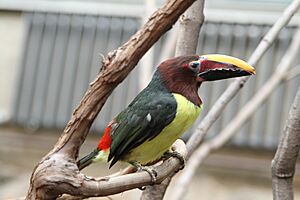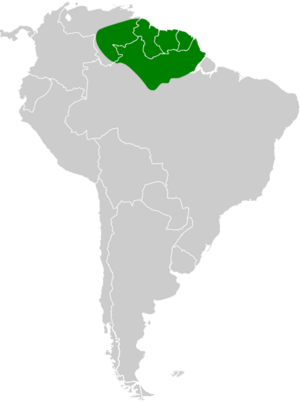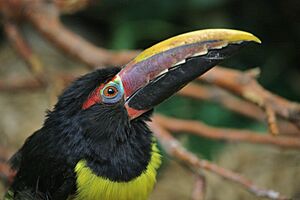Green aracari facts for kids
Quick facts for kids Green aracari |
|
|---|---|
 |
|
| Female at Philadelphia Zoo, Pennsylvania, USA | |
| Conservation status | |
| Scientific classification |
|
| Kingdom: | Animalia |
| Phylum: | Chordata |
| Class: | Aves |
| Order: | Piciformes |
| Family: | Ramphastidae |
| Genus: | Pteroglossus |
| Species: |
P. viridis
|
| Binomial name | |
| Pteroglossus viridis (Linnaeus, 1766)
|
|
 |
|
| Script error: The function "autoWithCaption" does not exist. | |
| Synonyms | |
|
|
Script error: No such module "Check for conflicting parameters".
The green aracari (Pteroglossus viridis) is a colorful toucan found in the forests of northeastern South America. It lives in places like the Amazon Basin and the Guianas. This bird is quite small for a toucan, usually about 30 to 40 centimeters (12 to 16 inches) long. It weighs around 110 to 160 grams (3.9 to 5.7 ounces).
Contents
About the Green Aracari

The green aracari was first named by Carl Linnaeus in 1766. Its scientific name, Pteroglossus viridis, means "green feather-tongue," which refers to the green feathers on its back. It is part of the larger toucan family.
What Does a Green Aracari Look Like?
Green aracaris have bright green feathers on their backs. They also have a large, colorful bill. You can tell male and female green aracaris apart by looking at their heads. Males have a black crown, which is the top part of their head. Females, on the other hand, have a reddish-brown crown.
Life and Habits of the Green Aracari
Green aracaris are active birds that spend their time in the trees. They have interesting ways of finding food and raising their young.
Reproduction and Family Life
Green aracaris usually breed from February to June. They build their nests inside holes in trees. A female aracari will lay about two to four white eggs. Both parents work together to care for their young birds until they are ready to leave the nest.
What Do Green Aracaris Eat?
These birds mostly eat fruit, which they find in the forest. They enjoy fruits from trees like Cecropia and a type of palm called Oenocarpus bacaba. Their large bill has serrated (saw-like) edges. These edges help the aracari grip and gather fruit easily. Sometimes, they also eat insects. Insects provide important protein for their diet.
Green Aracaris as Pets
The green aracari is a popular pet among the toucan family. They are often bred in captivity and can become very tame if hand-fed. Because they are active birds, they need a large cage to move around in. They also need toys to keep them from getting bored. A diet high in fruit is important for their health. If cared for properly, a green aracari can be a loving companion for many years.
 | Bessie Coleman |
 | Spann Watson |
 | Jill E. Brown |
 | Sherman W. White |


